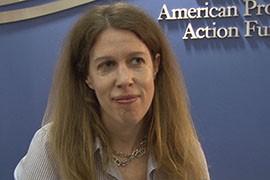Cronkite News has moved to a new home at cronkitenews.azpbs.org. Use this site to search archives from 2011 to May 2015. You can search the new site for current stories.
As Duncan pitches education in Phoenix, reform bills inch forward in D.C.
WASHINGTON – As Education Secretary Arne Duncan was in Phoenix to discuss the future of education Tuesday, experts in Washington offered hope for the future of a massive federal schools act – although they had differing visions of what a final bill should look like.
Both sides say there is “an appetite” to finally reauthorize the 50-year-old Elementary and Secondary Education Act – known since 2002 as the No Child Left Behind Act – which expired in 2007. Even though the act expired eight years ago, states have continued to receive federal funding for their schools.
While they hope to reauthorize the bill, most agree that the No Child Left Behind is in need of a face-lift.
“I think both sides of the aisle right now recognize that No Child Left Behind is not working,” said Lindsey Burke, Will Skillman Fellow in Education Policy for the Heritage Foundation. “It doesn’t work well for schools, it doesn’t work well for teachers and for students, so something needs to be done.”
Catherine Brown, vice president of education policy for the Center for American Progress, agreed that it was time to reauthorize and revamp the act.
But where Burke wants less of a federal presence in education policy, Brown said her center hopes for reauthorization that maintains a “strong system for low-performing schools,” while also focusing on early-childhood education and investment in teacher capacity.
Congress is making progress – in fits and starts.
The House Committee on Education and the Workforce in February approved the Student Success Act, a reauthorization proposal that would have put more decision-making authority in the hands of states. The bill was debated on the House floor, but put on hold before it could come up for a vote by the full House.
Brown said the House bill “took some important steps backwards,” saying it would shift money away from low-income communities.
“It also contained a lot of provisions to free up federal requirements so that states would have tremendous flexibility in what they did and how they served students who are poor,” Brown said. “And we recognize that states and localities have a role to play, but we would like to see strong federal backstops so that students, particularly low-income, minority, disadvantaged students, don’t get left behind again.”
But Burke said she didn’t think the Student Success Act gave enough control back to states – citing the need for a provision that would allow states to completely opt-out and “put its money toward any lawful education purpose under state law.”
“It does represent, in its current form, a real missed opportunity for conservatives to restore state and local control of education,” she said of the House measure.
Burke said her group would also like to see a limit on mandates and required programs, and have federal education dollars be “portable” – letting funding follow students to private schools.
“I think in an ideal world what we would like to see is states having control over the dollars that we currently spend,” Burke said.
On Tuesday, meanwhile, the chairman and ranking minority member of the Senate Health, Education, Labor and Pensions Committee unveiled their own bipartisan agreement aimed at fixing No Child Left Behind.
Sens. Lamar Alexander, R-Tenn., and Patty Murray, D-Wash., said in a joint statement that their Every Child Achieves Act of 2015 “would fix the problems with No Child Left Behind, while keeping successful provisions” according to a joint statement.
Alexander said in the statement that the proposal “continues important measures of academic progress” but leaves it to local officials to decide what to do with those assessments to improve teacher and student performance. That should “produce fewer and more appropriate tests,” he said. An overemphasis on testing has been a key criticism of No Child Left Behind.
The Senate proposal was welcomed by American Federation of Teachers President Randi Weingarten.
She said in a statement that the bill “restores ESEA’s original intent of mitigating poverty and addressing education equity” while moving away from “increasingly counterproductive focus on sanctions, high-stakes tests, federalized teacher evaluations and school closings.”











